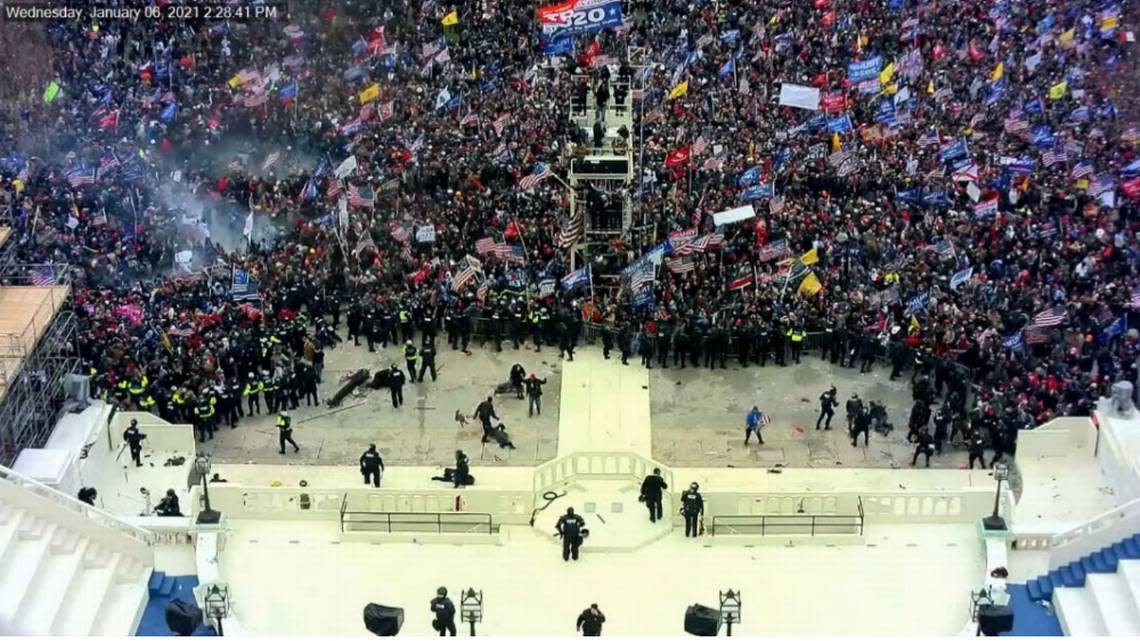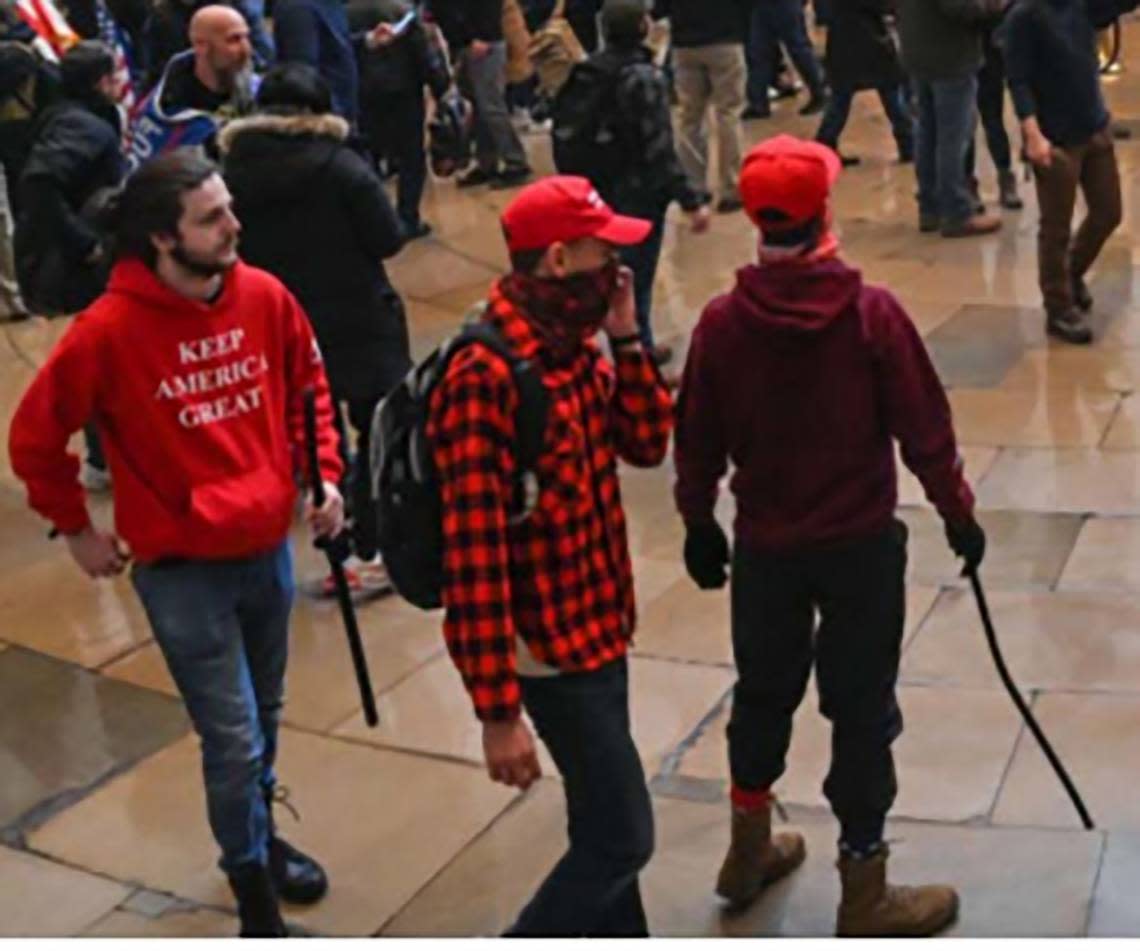Fort Mill, SC man charged in Jan. 6 Capitol riot sentenced to 2 weeks in prison
A federal judge on Friday sentenced a South Carolina man who had Nazi and white supremacist material on his cellphone to 14 days in prison for his participation in the Jan. 6 Capitol riot.
The case of Elliot Bishai, 21, of Fort Mill, was “one of the most difficult” Judge Tanya Chutkan said she has had to decide. She spoke for more than 20 minutes before pronouncing sentence, outlining the case’s complexities and nuances, and considering what Bishai’s situation posed for her.
On one hand, Bishai, who now works as a frontline firefighter combating dangerous forest fires around the country, has an excellent record of public service before and after the Jan. 6 riot, Chutkan told Bishai, who appeared before her in a federal courtroom in Washington.
On the other hand, Bishai’s actions at the Capitol were “more than those” of just an onlooker because he incited a mob to invade the Capitol, climbed through a broken window and shouted “Civil War 2!” Chutkan said.
Although he did not carry a weapon or scuffle with officers, Chutkan said, “There is no mob without you.”
Chutkan said a prison sentence, even just 14 days, was necessary to show there are consequences.
“Anyone who thinks this could not happen again is absolutely wrong,” she said.
Noting that Bishai had planned to enter the U.S. Army, Chutkan said he had a higher obligation to the country and should have known he was violating a “sacred trust.”
Although Bishai was remorseful, Chutkan said his remorse did not seem to extend to the “vastly outnumbered” law officers at the Capitol on Jan. 6, law officers who were protecting Congress as its members had gathered to “ensure the peaceful transition of power and certify a lawful election.”
“I’m not sure if you have a real understanding of how terrifying it must have been to those officers to see people coming through the window,” she told him, explaining she has watched videos of the Capitol breach many times, when rioters stormed in with gas masks and makeshift weapons, and, in another case, erected gallows outside.
“What strikes me is the lack of acknowledgment of the terror you inflicted by your participation in that riot,” she told Bishai.
There is an irony about Bishai, who that day was urging a civil war because the very government he was trying to overthrow abides by the rule of law, and that system has afforded him “every benefit” under the law, Chutkan said.
“I don’t know any place that does it better,” she said. “I hope that as you grow older and reflect on your actions that day... That whole system you wanted to tear down on Jan. 6 has given you all the presumptions and rights that you are entitled to. ... I hope that’s not lost on you.”
Seven of the 16 people from South Carolina arrested so far in connection with the Jan. 6 Capitol riot have pleaded guilty and have been sentenced. Sentences have ranged from 44 months in prison to probation to home detention. An eighth person has pleaded guilty and will be sentenced in October.
Two South Carolinians have requested trials, and six are still in the preliminary stages of deciding whether to plead guilty or seek trial.

Bishai apologizes, prosecutor says he was not a ‘passive participant’
Chutkan made it clear Friday that she did not take Bishai’s Nazi and white supremacist material into consideration in determining Bishai’s sentencing. He has a right to his beliefs, she said.
Bishai’s cell phone made some 80 Nazi and white supremacist images on it, as well as more than 400 videos of a white supremacist online personality, according to a prosecution memo.
“People are entitled to their political beliefs, no matter how offensive they may be,” she said. “I am going to punish him not for his beliefs, but for what he did.”
Bishai also might want to reflect on his actions as he goes on in life and expose himself to “a wider variety of sources,” the judge said.
On Jan. 6, Bishai entered the Capitol with two men — Grayson Sherrill, who is charged with hitting a police officer, and Elias Irizarry, a Citadel student, who carried a metal pipe inside the Capitol.
Sherrill and Irizarry have trials set for Jan. 3.
The three had traveled to Washington, along with Bishai’s girl friend, to attend former President Donald Trump’s “Stop the Steal” rally before the riot, according to evidence in the case.
In her summation of the case, Chutkan noted that Bishai was well aware of how dangerous the mob scene at the Capitol was because he advised his girlfriend, who was not identified, not to enter the building with him and his two friends.
Bishai pleaded guilty in April to entering and remaining in a restricted area within the U.S. Capitol. He could have received up to one year in prison.
“This defendant shouted at the top of the stairs ‘Civil War 2.’ That’s what he hoped would happen that day,” federal prosecutor Grace Albinson told the judge. “He was not a passive participant in the riot that day.”
Bishai apologized Friday.
”If there was some way I could make this entire thing not have happened, ... I would,” he said before sentencing. “I just want to sincerely apologize to the nation and sincerely apologize to the court.“
Don Brown, a Charlotte lawyer representing Bishai, stressed that his client had been fighting wildfires and urged the judge for no confinement so he can get back out “to the fire line as soon as possible.”
Brown also submitted numerous support letters from people who know Bishai, and urged Chutkan to take his lack of maturity into account.
Brown said that because of Bishai’s arrest, he was dropped from being accepted in an elite military program to train to become a pilot to fly U.S. Army helicopters.
Prosecutors noted in a pre-sentence filing that at the time of the riot that Bishai was a member of the federally-supported Civil Air Patrol, the civilian auxiliary of the U.S. Air Force and should have known that being part of the Capitol meant that he “betrayed his duty to keep the homeland safe.”
The Civilian Air Patrol’s mission is “devoted to public safety,” the memo said.
“The dream is gone,” Brown told the judge Friday, stressing that Bishai has been punished enough. “What he did on Jan. 6 was an aberration.”
Assistant U.S. Attorney Albinson said that Bishai’s “military experience makes this crime more egregious, not less.”
Bishai’s hearing Friday took place as public interest across the nation appears to be picking up in ongoing committee hearings by a House investigative committee that is looking into the events that caused the Jan. 6 riots. The committee has surfaced evidence indicating that the riot was the most visible of several simultaneous efforts by Trump and his allies to overturn the November 2020 election.
Chutkan is a judge who “has consistently taken a hard line in punishing Capitol rioters. She has handed down terms of imprisonment to all 13 riot defendants who have come before her, matching or exceeding the Justice Department’s sentencing recommendation in every case,” an Associated Press review of records found.
However, on Friday, Chutkan gave Bishai a lower sentence than the one month in prison that prosecutors had asked for.
In what Department of Justice officials have called the largest criminal investigation in American history, more than 855 people have been charged with offenses in the Capitol riots. Approximately 140 police officers were assaulted Jan. 6 at the Capitol, including about 80 U.S. Capitol Police and some 60 from the Metropolitan Police Department.
Evidence to convict the rioters has come from surveillance videos inside and outside the Capitol, cellphone location records and social media postings by the rioters. Many rioters, such as Bishai, were turned in by tipsters concerned about their behavior, according to records in his and others’ cases.

